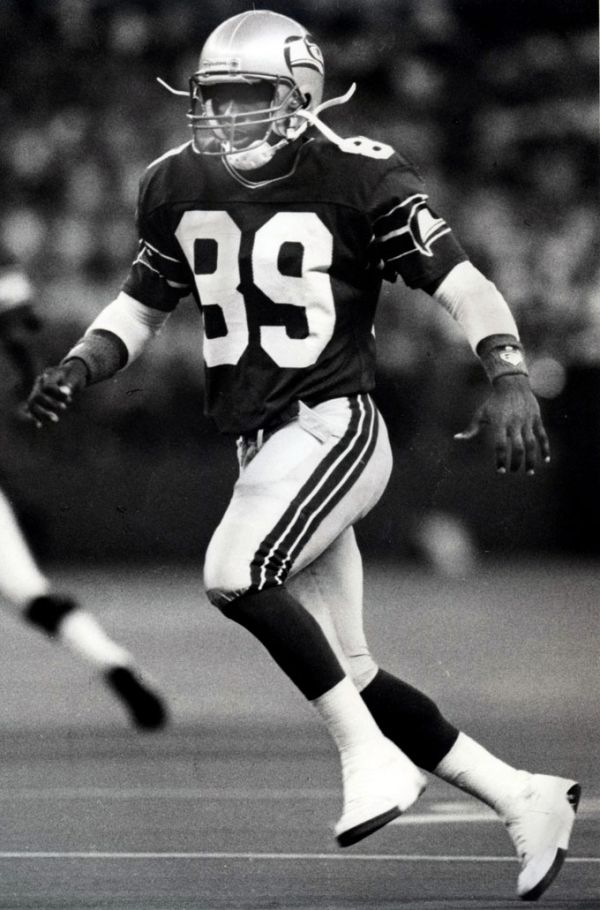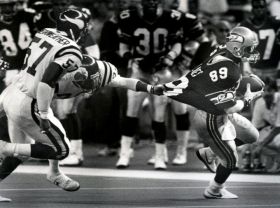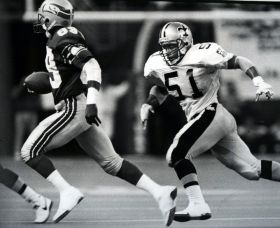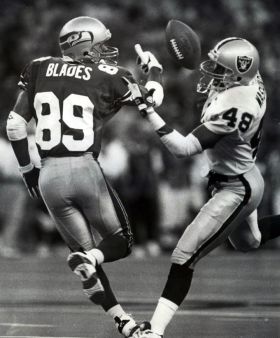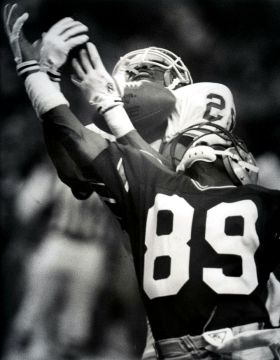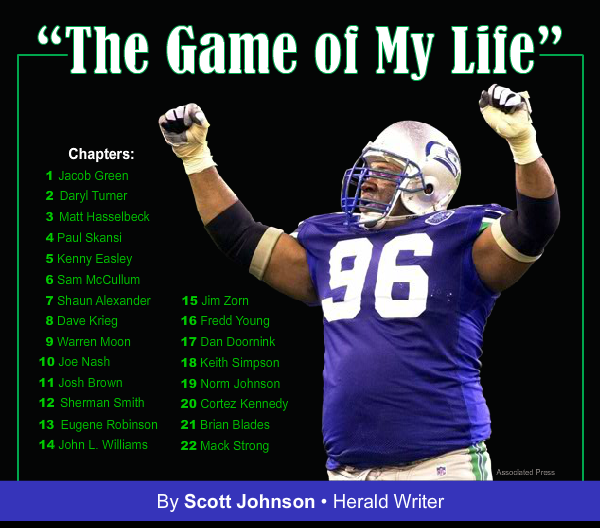The spotlight was on him again, only this time Brian Blades cringed at its glow. So many times, he stood beneath the lights and basked in the attention that came with them. He had played in so many big games at the University of Miami, had delivered in the Seattle Seahawks' most important game of his rookie season, had become one of the NFL franchise's greatest receivers of all time.
And yet now, with all eyes upon him, Brian Blades was uncomfortable with the attention and scared for his life. Three days earlier, a jury had found him guilty of manslaughter following the accidental shooting death of his cousin, and now Blades was drowning in the middle of a media frenzy. He stood before a judge, expecting to hear the details of his looming sentence.
Instead, Brian Blades heard the most important words of his life. He was free. The rest of his life was his again, and Brian Blades was determined not to get himself into that kind of life-altering predicament again. His 1996 manslaughter trial put the fear of God in him, and when the judge reversed his sentence, Blades was grateful for the reprieve and thankful for the second chance.
"It made me a much better man," Blades said in 2007, recalling the trial that stemmed from an incident resulting in the death of his cousin. "You live and you learn. I learned a lot from that, from what I went through. I think, as my wife would say, I grew up."
Eleven years after the most exhausting summer of his life, Brian Blades was able to outrun his past. He had a wife of five years, Tisha, and a third child, his first son. He was working as a teacher and football coach at Academy High School in Coral Springs, Fla., where his boss was his younger brother, Bennie.
Brian Blades was living, by all accounts, a normal life.
Finally.
Family has been at the center of Brian Blades's life for as long as he can remember. When he started boxing as a 6-year old, it was because he wanted to follow in the footsteps of his father, Freddie. When he played college football, it was as a teammate of younger brother Bennie, who would go on to face him as an opponent in the NFL.
Long before those family ties got frayed, before Brian Blades would go to trial for the manslaughter of his cousin, the relationships of relatives were what pushed him to make the most out of his athletic ability.
Of course, Bennie was the one who pushed Brian the most. Just 14 months younger than Brian, Bennie Blades brought out the best in his big brother.
"We always competed, in track and football," Brian Blades said. "If he scored a touchdown, I wanted to score a touchdown. If he won his race, I wanted to win mine.
"I would tell people: my brother was a better natural athlete than I was. I really had to work at the things I wanted to do. I had to work harder. It was kind of natural for him."
The Blades brothers crossed paths several times in their athletic careers, but their first steps came in arenas. While Bennie Blades was content spending his childhood playing with Tonka trucks or reading books, Brian followed his father into the boxing ring. Freddie Blades had a somewhat distinguished career as a boxer, having enough success that he spent some time training with Muhammad Ali when the world champion would work out in Florida. An impressionable son, Brian Blades was willing to do whatever it took to make it as a boxer.
Freddie Blades trained his son, who fought his first bout at the age of 6 years old.
"Actually, I did pretty good. I won," Blades recalled in 2007. "My mom was just like, 'I want you to do something else.'"
Freddie Blades eventually steered his older son away from boxing as well.
"My dad didn't want me to box because of the structure of my eyebrow, saying it might get cut a lot, and because of the bridge of my nose," Blades recalled. "(My athletic career) took a turn. ... I was kind of disappointed, but I just had to find something else to do."
That was when Brian Blades met a man named Johnny Alexander. Along with brothers Manny and Slim, Johnny Alexander ran a track program for youths in the Miami area. Brian convinced Bennie to join him, and the Blades brothers quickly fell in love with the sport. The Alexanders also ran a football program, in which Brian and Bennie participated when they were 8 and 7 years old, respectively. Brian Blades soon realized that he didn't need boxing to make him happy.
"They just took us in like we were one of their kids," he said of the Alexander family. "They groomed us into young men. They taught us right from wrong, along with my parents. We just took off from there."
The Blades brothers became huge football fans, and not just when they were playing. Brian Blades fell in love with the Oakland Raiders, partly because of their tough persona but also because the team had a pair of receivers in Cliff Branch and Fred Biletnikoff that would quickly become Brian Blades' heroes.
When Brian and his brother were playing the game, they had plenty of success of their own – right from the start.
"We took to the game pretty quickly," Brian Blades recalled. "Coming from boxing, you have to be a little tough. And both of us had a little speed. I started at free safety and running back. My brother was the other running back and played linebacker. We played those positions all the way through little league."
When the Blades brothers arrived at Piper High School in Fort Lauderdale, Brian started playing cornerback and wide receiver. He got recruited to the University of Miami – a college football powerhouse – as a cornerback, turning down Florida State because Seminoles coach Bobby Bowden wanted him to play wide receiver. As it were, Miami coach Howard Schnellenberger eventually convinced Brian Blades to switch to the offensive side of the ball.
"I went with his judgment," Blades said of the position change. "He's been to the pro level, so I was like, OK, if I want to get (to the NFL), I have to try it. And it worked out."
Blades had some success in a Miami offense that was led by future NFL quarterbacks Bernie Kosar and Vinny Testaverde, but he often found himself in the shadow of an outspoken, playmaking receiver named Michael Irvin. The brash All-American became Miami's all-time leader in receptions (143), receiving yards (2,423) and receiving touchdowns (26). Blades, meanwhile, had a modest 80 receptions in his four-year career.
"When you're a guy who's laid-back, you make the most of your opportunities," Blades said in 2007. "I wasn't one of those guys where I'm like, 'You have to throw the ball to me.' That just wasn't me."
His brother Bennie eventually followed Brian to Miami, where the pair would help the Hurricanes win 40 games from 1984 through 1987, with one national title along the way. Irvin and Testaverde were the inarguable stars of the 1987 national championship team, but Brian Blades made enough of an impression that NFL scouts were intrigued by his potential. Many of his high-profile teammates – like Irvin, Testaverde and even brother Bennie – were projected as top-10 picks in the draft. Brian Blades was seen as a middle- to late-round selection by well-known scouting guru Mel Kiper Jr.
Upon hearing that, Blades recalled: "I said, if he knows something that the man doesn't know, let me go pray about it. So I took my daughter to the church with me. We went to church, and I prayed, and I said, 'Lord, if that's where you want me to go, sixth, seventh or eighth round, so be it. I'll just work hard, as always, and do what I have to do to make the team and do the best I can. If not, send me as far away from Miami as possible.'
"You know that saying, 'Be careful what you wish for?' I went as far away as possible."
While his brother, a safety, was selected by Detroit with the third overall selection, Blades got picked by the Seattle Seahawks in Round 2. The Seahawks were looking for an eventual replacement for aging star Steve Largent, and so they used their top pick – the No. 1 selection was forfeited because Seattle took linebacker Brian Bosworth in the previous year's supplemental draft – on the University of Miami's other receiver. The excitement of getting drafted much earlier than expected was tempered by the unknown of traveling across the country. But he was eager to learn from Largent and be far away from the distractions of home.
"I wanted a change," he said. "I played little league, high school and college (near Miami). I wanted the experience of being away from South Florida.
"My rookie year was tough because it was my first time being away from my mom, my father and my family. And my family is real close. There were a couple of times I wanted to quit and go back home to be with the family. It wasn't the distance. It was the time when it rains 20 days straight in Seattle. It kind of got to me."
But Blades eventually got used to the change in scenery. After veteran Ray Butler got hurt in the third game of the regular season, Blades stepped into the starting lineup and made the most of his opportunity. He caught 40 passes that year, or half the total of his entire college career at Miami.
What wasn't such an easy adjustment was becoming a Raider Hater. In a town where the Raiders were seen as Public Enemy No. 1, Blades had to keep secret his fondness for the Silver and Black. As would be the case for any football player who put on a Seahawks uniform in those days, beating the Raiders became a learned passion. In his first game against a team now known as the Los Angeles Raiders, Blades caught two passes for 54 yards and a touchdown in a 35-27 home win on Nov. 28 of that year.
But he would save his best for last. The Seahawks and Raiders played a rematch on Dec. 18, and a division title was on the line. Seattle had never won the AFC West, so the game had added significance. And Blades, who had quietly come into his own over the first 15 weeks of the season, would play a major role in what happened that Sunday afternoon at the L.A. Coliseum.
Seahawks vs. Los Angeles RaidersDecember 18, 1988
as told by Brian BladesGoing into the meetings on Wednesday of that week, they gave us the game plan, and I knew I was going to have a lot on my shoulders. I was looking at the plays we were working on in practice, and I was getting the opportunity to make a lot of plays on the practice field. After we got done with practice on Friday, I called my mom and said: 'I'm going to have an opportunity to make some plays, and I just hope I don't disappoint the organization.'
She said: 'Just go out and be yourself and have fun. Don't worry about what's on the line. Just look at it like it's another game. Go out and have fun.'
As it turned out, I was a big part of the game plan that day. Me, as a rookie, being a big part of the game plan in a game we knew we had to win was kind of special. You come in as a rookie, and just to get an opportunity to play is good. But to be a part of the game plan when the game is on the line and the season is on the line, I just didn't want to let those guys down. I wanted to go out, do my best and make the plays I was afforded to make. I just wanted to make the best of it.
Fortunately, I did. I caught four passes for 123 yards, with a pair of touchdowns. They gave me the opportunity, and I made the most of it.
I remember when I first got there, you go through the things where they tell the rookies to get to the back of the line. But I was always running to the front. I always wanted to be a part of the team and to make plays. I was their first pick because they didn't have a first-round pick, so going into camp, my main objective was to learn as quickly as possible. I wanted to make sure I got into training camp as soon as possible so I could learn the offense and give myself a chance to be a part of the offense once the season started. That was my main concern.
Coming into the league as a rookie and just having an opportunity to play against the Raiders down there, with an opportunity to win a division title, was special for me. Growing up, you knew about the Oakland Raiders, the Pittsburgh Steelers, the Dallas Cowboys. Those were the kinds of teams that, during their Super Bowl runs, when you go outside as a kid and pick up the football, you try to emulate. So that was exciting for me. And just to play with the guys I was on the team with: you're looking at the Jacob Greens and the Steve Largents and the Dave Kriegs. Those guys kind of took me under their wings. Just to be a part of that team, and to have some kind of impact on the game, it was special for me.
Just having the opportunity to play against the Raiders, growing up watching Al Davis, and the mystique, that was exciting. I was just excited to be in the league, to make the most of the opportunities and to do what I could and, for an organization that took a chance on me, I wanted to prove that they made the right decision.
Going into the Oakland game, it was a must-win for us. Just to be a part of the game plan was exciting, but it was a lot of pressure for a rookie. I didn't want to let the guys down that had been there for awhile. It was an opportunity for them to get back to the playoffs. So I just wanted to go out there and make as many plays as I could.
I had two touchdowns in that game. Dave Krieg went to me a lot. My number was called quite a few times. I scored in the first quarter to give us a 14-7 lead, and I added another touchdown at the beginning of third quarter to pull ahead 30-17. We held on to win 43-37. Fortunately, I made the plays I had an opportunity to make, and that gave us an opportunity to win.
That game helped us clinch the first division title in franchise history. I was just a rookie, so I thought it would be the first of many. But looking back, that was the only season I went to the playoffs. That was the highlight, my rookie year. As far as the team, in my 11 years, it was very disappointing. I was hoping we would have more opportunities to be in the playoffs, to play in the Super Bowl. I played in one Pro Bowl, and that was great, but I felt like I could have played in more. You have no control over that. If it doesn't happen, it doesn't happen. You can't lose any sleep over it.
I often wonder why we didn't have more success, but I still can't put my finger on it. It was a lot of things. I really don't know. I played for three different coaches in my 11-year career. It's kind of hard to say.
For whatever reason, the Seahawks posted just one winning record over the final 10 years of Blades' career. During an 11-year career that brought plenty of individual success but not as much good fortune for the team, Blades caught 581 passes to rank second in franchise history. He went to the Pro Bowl in 1989, became the first Seahawks receiver to catch 80 passes in a single season and recorded 1,000-yard seasons four times.
But the latter years of Blades's career were marred by controversy. And after the 1998 season, he was released as the team headed in a different direction.
"Things ended not the way I wanted it to end," he said in 2007. "But I understand the business. There are ways you do things. I thought that I had done enough to not get a phone call from someone other than the coach. That left a bitter taste in my mouth."
During his career, Brian Blades played five games against a Detroit Lions team that included a safety named Bennie Blades.
"I was 3-2," Blades said of his won-loss record against his younger brother's team. "The first time we played, it was exciting. We had our whole family there. It was our first time playing on opposite teams. He was a talker, like most defensive players. It was something I had to deal with. His corners that I played against couldn't talk, so he did the talking. It was very exciting just to play against your brother and be in the league with him."
Brian Blades played 11 seasons, one more than his brother. But the latter years of his career would be overshadowed by what happened off the field.
While Blades doesn't like to talk about the specifics of a July 5, 1995, night, the court records show that he got into some kind of an argument with Bennie while returning from a night on the town. According to testimony, Brian went to retrieve a gun at his home, where he was confronted by a 34-year-old cousin named Charles Blades. Reports of the incident maintain that Charles was trying to act as a peacemaker, but the gun eventually fired, killing Charles.
At a press conference on his parents' lawn a week later, a teary Blades admitted shooting his cousin but maintained that it was an unintentional.
"I know Charles' death was an accident," Blades told reporters on July 12, 1995. "The police know Charles' death was an accident. And, most important, God knows Charles' death was an accident.
"... One week ago, I held Charles in my arms after he had been shot. Not only did Charles die last week, but a part of Brian Blades died."
Blades originally pleaded "no contest" to manslaughter charges, but he later turned in a plea of "not guilty." During a highly-publicized court case that left Seahawks fans wondering whether Blades would ever play again, the receiver was emotional at times and stoic at others. At one point during the trial, the team of prosecutors hurt its own case while re-enacting the possible scene in an effort to prove how unlikely it would be for a gun to discharge without cause. The gun being used in the demonstration fired a blank in the courtroom, blowing a hole in the prosecutors' theory.
But the jurors saw differently. On June 15, 1996, the jury came back with a verdict. The veteran receiver was convicted of manslaughter and was staring at the possibility of a 10-year prison sentence. After spending a weekend in limbo, perhaps the most difficult 72 hours of his life, Blades returned to court on a Monday morning to hear about his sentence. He stood before Circuit Court Judge Susan Lebow, in whose hands his life now rested. The words came out of her mouth, but their impact did not immediately hit Blades. Only after his agent, Drew Rosenhaus, embraced him did the message set in. Judge Lebow had reversed the conviction.
Brian Blades was free.
He was soon swarmed by friends and family. His lawyers stood nearby, their work behind the scenes paying off in the end. During the trial, they had secretly filed a motion even before the jury had reached its verdict. The judge agreed that the prosecution had failed to prove that Blades had acted with culpable negligence.
"Based upon my review and evaluation of the law, I have determined that the defendant's motion should be -- and hereby is -- granted," the New York Times quoted Judge Lebow as saying in announcing her decision.
A few minutes later, an emotional Blades emerged from the courtroom and told a reporter from KING-TV: "It is a tragedy, a tragedy I'll have to deal with the rest of my life."
Blades went back to the Seahawks for three more seasons. He also returned to society while trying to use the tragedy as a learning experience. He met a woman named Tisha who would become his wife in 2002. They bought a house in South Florida and had a son. Blades occasionally talks about the night when his cousin was killed, but he rarely gets into much detail.
"I've never been through therapy," he said in 2007, at the age of 42. "Just a lot of prayer and love from my family and friends, that got me through it. Every now and then it comes up, but it's something I have to live with. It's made me a better person, a better man, a better father."
Tisha has helped him carry on with his life.
"She's been the backbone," he said. "She gives me the strength to go on and continue on with life. I have a wife and a son and two daughters (from previous relationships) and right now I live for them."
Brian Blades has always lived for his family in both tragedy and triumph. Over the years, he remained close with his younger brother, despite the family tragedy. As proof of their eternal bond, Bennie Blades hired Brian as a teacher shortly after being named dean of students at Academy High School in Coral Springs, Fla. Brian was thankful for the opportunity, just like he was thankful for the sibling rivalry that helped fuel not just one NFL career but two.
"He made me a better player because I always wanted to be better than him, and I really had to work on it," Brian Blades said. "It came naturally for him. Once I got drafted, I always said I wanted to have a better NFL career.
"It's over with, and it's up to everybody else to have their opinions. Eleven years is long time to play in the league, and I enjoyed every minute of it. I hope the team that took a chance on me feels I did enough."
When asked about his career as a Seahawk, and the way his life took a tragic turn shortly thereafter, Blades said there are plenty of lessons to be learned.
"The moral of my story is, I'm a young man who's been through a lot of ups and downs," he said. "I'm still walking with my head up, still walking straight and enjoying life.
"Hopefully, the Seahawks will appreciate my 11 years with the team, and hopefully one day I'll be in the Ring of Honor."
Until then, it's enough for Brian Blades just to be free.

